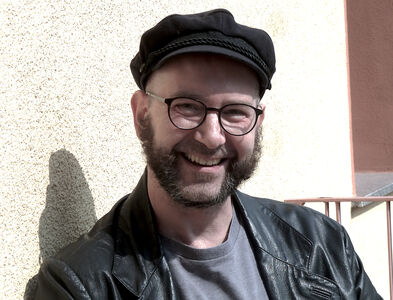Robin Hoffmann
born on March 6 th 1970 in Gadderbaum (Bielefeld), childhood in Wiesbaden, youth in Oldenburg i.O. Throughout his schooldays and later, during his community service in Munich, he worked in various rock, wave, punk and noise bands as an electric bassist, guitarist, singer and songwriter. His interest in radical forms of artistic expression, which he had already developed at this time, continued during his studies of classical guitar in Frankfurt Main, which he began at Dr. Hoch's Conservatory in 1991 and continued at the Frankfurt Hochschule für Musik und Darstellende Kunst in 1995. In addition to intensive instrumental training with Thomas Bittermann and Michael Teuchert, he began composing, attended courses in new music and experimental improvisation and began his studies in composition with Claus Kühnl, who played a decisive role in his artistic development. He participated as a guitarist in numerous performances of 20th century repertoire works in the class of Bernhard Kontarski (Chamber Music New Music), as well as in premieres of Hans Zender's composition class. After completing his guitar studies, he focused on his compositional activities and studied composition with Nicolaus A. Huber at the Folkwang Hochschule in Essen from 1999 to 2002, which left a lasting impression on him.
Robin Hoffmann lives together with his wife, the composer Annesley Black, and son Bodo in Frankfurt Main. He was lecturer for composition/music theory at the Frankfurt University of Music from 2005 to 2022, with additional teaching assignments at the musicological institute of the Philipps University Marburg (2013-2020), at the Kronberg Academy (2013-2016) or at the Stuttgart University of Music (substitute in the composition class of Martin Schüttler, 2022). From 2021 till 2023 he led the composition class at the Institute of Music of Hochschule Osnabrück.
He composes for solo instruments, vocals, chamber music, ensemble or orchestra, as well as electroacoustic compositions and experimental improvisation. His works have been performed worldwide by young, committed musicians as well as by established ensembles and orchestras at festivals such as the Warschauer Herbst, the Gogolfest Kiew, Stockholm New Music Festival, Eclat Stuttgart, Wittener Tage für Neue Kammermusik, Ultraschall Berlin and many others.
Robin Hoffmann also appears as an interpreter of his own works or as a performer in ensemble collectives. He has performed numerous performances of his compositions An-Sprache for bodypercussion solo (2000), Birkhahn-Studie for black grouse call (2005) and œhr for listener solo (2006) and acted as soloist in Kunst pfeifen for art whistler and ensemble, which he premiered together with Klangforum Wien (Graz and Vienna 2007) and produced with MAM.Manufaktur für aktuelle Musik for his portrait CD published on Thorofon in 2018.
He has acted as vocal performer in Sergej Newski's Fluss together with Klangforum Wien (Vienna 2005) or Ensemble Modern (Stuttgart 2007), as shouter in his own 4 sehr späte Lieder together with MAM (Bremen 2016) or in Alexander Schubert's Bird Snapper with Ensemble l'art pour l'art (Winsen 2017), as speaker in Frederic Rzewski's Coming Together with Ensemble l'art pourt l'art in Winsen, as well as the International Ensemble Modern Academy in Frankfurt 2019. He often employs small devices, jaw's harps, hunting-and birdcalls, with or without electronics, for example as a "performer from the woods" („Waldperformer“) in Benedikt von Peter's production of Verdi's I Masnadieri (Frankfurt Opera 2009), at White Series with Annesley Black, Andrew Digby and Dieter Assmann (Witten 2013) or in Pfeifkonzert together with Annesley Black (Frankfurt 2018).
1996-2005: Numerous concert activities as a solo guitarist, in the guitar duo with Christopher Brandt and in ensembles with engagements in theatres Giessen, Darmstadt, Frankfurt opera, the Radio Symphony Orchestra Frankfurt or the ohton-Ensemble, Oldenburg and others.
In 1997/98 he performed as a vocal performer at sound poetry events together with Dirk Hülstrunk, Mitch Heinrich and Hans-Jürgen Lenhart.
In 2001, together with Mark L. Kysela, he founded STROM – das Ensemble der Autoren under whose name the two musicians developed performances and joint compositions with the inclusion of live electronics. In the year of its foundation, STROM won the Junge Kultur competition of the Düsseldorf Altstadtherbst.
In 2002 Robin Hoffmann received the 1st prize of the Deutsche Studienpreis of the Körber foundation for his composition An-Sprache for bodypercussion solo. His contribution to the topic of the competition Bodycheck - Wieviel Körper braucht dem Mensch? („How much body does man need?“) resulted in a lively interdisciplinary exchange in which the discourse about the body was continued on both an artistic and a scientific level, for example in the project Choreographers and Composers of the Berlin Academy of Arts
2002, at the Interdiciplinary College 2004 Body & Motion with representatives from the field of Artificial Intelligence, at Motion Bank of the Forsythe Company 2012, at the spring conference of the INMM in Darmstadt 2016 Body Sounds - Aspects of the Physical in Music and many other invitations to lectures, workshops and projects.
In 2002-04 he played in the Gothic-Band Chamber and wrote the arrangements for the CD releases l'orchestre de chambre noir (2002), Ghost Stories and Fairy Tales (2003) and Solitude (2004).
In 2005 he was awarded the Stuttgart Composition Prize for his works was stimmt for six voices and Birkhahn-Studie for black grouse call.
In 2006 he received the Kranichsteiner Composition Prize at the Darmstadt International Summer Courses.
From 2003-2011 he was the first chairman of the Frankfurt Society for New Music, which he co-founded. During his participation in the board, the association organized and curated discussion and concert series with almost 100 events, which successfully offered a forum for the local new music enthusiasts and in which the richness and diversity of the extended contemporary music production could be documented.
In 2010 and 2012 he collaborated with director Dieter Reifarth and composed the music for his films Lawrence of Arabia - The Invention of a Hero and Haus Tugendhat.
In 2019 he was honoured with the Hans-Werner-Henze-Prize of the Landschaftsverband Westfalen-Lippe, which is awarded every six years.
In 2022 he was elected as the 1st Chairman of the Institute for New Music and Music Education, Darmstadt.


